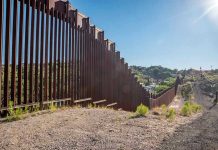
The Supreme Court’s latest decision unchains immigration enforcement in Los Angeles, sparking a new chapter in the fight against illegal immigration.
Story Highlights
- The Supreme Court lifts restrictions on LA immigration raids, allowing broader enforcement.
- This decision is seen as a victory for those advocating for stricter immigration controls.
- Concerns arise over potential impacts on communities and civil liberties.
- Supporters argue it restores law enforcement’s ability to uphold immigration laws effectively.
Supreme Court Decision Restores Enforcement Powers
The U.S. Supreme Court has lifted restrictions imposed by a district court on immigration raids in Los Angeles, marking a significant shift in the enforcement of immigration laws in the city. This decision, made in favor of the Trump administration, allows federal agents to conduct broader immigration enforcement operations, a move welcomed by those advocating for stronger immigration controls and border security.
The restrictions had been in place following allegations of overreach in previous raids, where U.S. citizens were mistakenly detained. Supporters of the Supreme Court’s decision argue that the ruling restores necessary enforcement powers to federal agencies, enabling them to address illegal immigration more effectively. Critics, however, express concerns about potential civil liberties violations and adverse effects on immigrant communities.
Implications for Law Enforcement and Communities
With the restrictions lifted, immigration enforcement agencies are expected to ramp up operations in Los Angeles. This increase in enforcement activity aligns with President Trump’s commitment to securing the nation’s borders and addressing illegal immigration, a key issue for his administration and a longstanding concern for many conservatives.
While the decision is seen as a victory for law enforcement and those advocating for stricter immigration policies, it also raises questions about the balance between national security and individual rights. Community leaders and civil rights organizations have voiced apprehensions about the potential for racial profiling and the erosion of trust between immigrant communities and law enforcement.
Broader Impact and Future Considerations
The Supreme Court’s ruling may set a precedent for similar cases across the United States, potentially influencing the scope of immigration enforcement nationwide. As these operations intensify, the impact on local communities, particularly those with significant immigrant populations, will be closely monitored.
Supreme Court lifts district court’s LA immigration raid restrictions https://t.co/bA3pSRWXgN
— Washington Examiner (@dcexaminer) September 8, 2025
The debate over immigration enforcement continues to be a polarizing issue in American politics, reflecting broader tensions between national security priorities and civil liberties. This decision underscores the ongoing struggle to find a balance that satisfies both security concerns and the protection of individual rights.
Sources:
SurgeGraph: YouTube Ownership and Timeline
OfficeTimeline: YouTube History Timeline
Britannica: YouTube Facts and History









